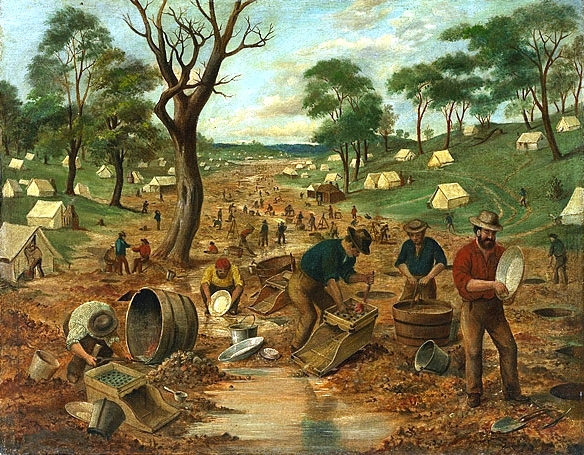|
Proclamation Declaring The Establishment Of The Commonwealth Of Australia
The Proclamation Declaring the Establishment of the Commonwealth was a royal proclamation made by Queen Victoria on 17 September 1900 federating the six separate British colonies of New South Wales, Queensland, South Australia, Tasmania, Victoria and Western Australia under the name of the Commonwealth of Australia. The proclamation, which took effect on 1 January 1901, was issued under the authority granted by the ''Commonwealth of Australia Constitution Act 1900'', an Act of the Parliament of the United Kingdom. Text of the proclamation PROCLAMATION UNITING THE PEOPLE OF NEW SOUTH WALES, VICTORIA, SOUTH AUSTRALIA, QUEENSLAND, TASMANIA, AND WESTERN AUSTRALIA IN A FEDERAL COMMONWEALTH. ''(Imperial Statutory Rules and Orders, revised 1948, Vol. II., Australia, p. 1027.) 1900 No. 722.'' At the Court at Balmoral, The 17th day of September, 1900. Present: ''The Queen's Most Excellent Majesty in Council.'' ''The following Draft Proclamation was this day read at the Board and ... [...More Info...] [...Related Items...] OR: [Wikipedia] [Google] [Baidu] |
Royal Proclamation
A proclamation (Lat. ''proclamare'', to make public by announcement) is an official declaration issued by a person of authority to make certain announcements known. Proclamations are currently used within the governing framework of some nations and are usually issued in the name of the head of state. A proclamation is (usually) a non-binding notice. A general distinction is made between official proclamations from states or state organs with a binding character and proclamations from political-social groups or organizations, both of which try to win over the mood of those addressed. In addition, the procedure of proclaiming the beginning of a rule over a certain ruling territory is called a proclamation. For example, on July 26, 1581, the Proclamation of Dutch Independence was signed which led to the creation of the Dutch Republic in 1588, formally recognized in 1648 by the Peace of Münster. The announcement of the intention to marry two people, the bidding, was referred to ... [...More Info...] [...Related Items...] OR: [Wikipedia] [Google] [Baidu] |
Commonwealth Of Australia Constitution Act 1900
The Constitution of Australia (or Australian Constitution) is a constitutional document that is supreme law in Australia. It establishes Australia as a federation under a constitutional monarchy and outlines the structure and powers of the Australian government's three constituent parts, the executive, legislature, and judiciary. The constitution was drafted between 1891 and 1898, through a series of conventions conducted by representatives of the six self-governing British colonies in Australia. The final draft was then approved in a set of referendums from 1898 to 1900. The British government objected to some elements of the final draft, but a slightly modified form was enacted as section 9 of the ''Commonwealth of Australia Constitution Act 1900'', an act of the Parliament of the United Kingdom. The act was given royal assent on 9 July 1900, was proclaimed on 17 September 1900, and entered into force on 1 January 1901. The constitution gave the six colonies the status of ... [...More Info...] [...Related Items...] OR: [Wikipedia] [Google] [Baidu] |
1900 In Australian Law
Nineteen or 19 may refer to: * 19 (number), the natural number following 18 and preceding 20 * one of the years 19 BC, AD 19, 1919, 2019 Films * ''19'' (film), a 2001 Japanese film * ''Nineteen'' (film), a 1987 science fiction film Music * 19 (band), a Japanese pop music duo Albums * ''19'' (Adele album), 2008 * ''19'', a 2003 album by Alsou * ''19'', a 2006 album by Evan Yo * ''19'', a 2018 album by MHD * ''19'', one half of the double album ''63/19'' by Kool A.D. * ''Number Nineteen'', a 1971 album by American jazz pianist Mal Waldron * ''XIX'' (EP), a 2019 EP by 1the9 Songs * "19" (song), a 1985 song by British musician Paul Hardcastle. * "Nineteen", a song by Bad4Good from the 1992 album '' Refugee'' * "Nineteen", a song by Karma to Burn from the 2001 album ''Almost Heathen''. * "Nineteen" (song), a 2007 song by American singer Billy Ray Cyrus. * "Nineteen", a song by Tegan and Sara from the 2007 album '' The Con''. * "XIX" (song), a 2014 song by Slipknot. ... [...More Info...] [...Related Items...] OR: [Wikipedia] [Google] [Baidu] |
History Of Australia (1851–1900)
The History of Australia (1851–1900) refers to the history of the indigenous and colonial peoples of the Australian continent during the 50-year period which preceded the foundation of the Commonwealth of Australia in 1901. Gold rushes The discovery of gold, beginning in 1851 first at Bathurst in New South Wales and then in the newly formed colony of Victoria, transformed Australia economically, politically and demographically. The gold rushes occurred hard on the heels of a major worldwide economic depression. As a result, about two per cent of the population of Britain and Ireland immigrated to NSW and Victoria during the 1850s. There were also large numbers of continental Europeans, North Americans and Chinese. The rushes began in 1851 with the announcement of the discovery of payable gold near Bathurst by Edward Hargraves. In that year New South Wales had about 200,000 people, a third of them within a day's ride of Sydney, the rest scattered along the coast and through ... [...More Info...] [...Related Items...] OR: [Wikipedia] [Google] [Baidu] |


